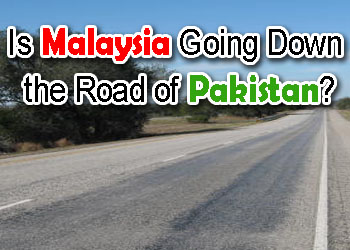Archive for July 18th, 2007
Is Malaysia Going Down the Road of Pakistan?
Posted by Kit in Farish Noor, nation building, Religion on Wednesday, 18 July 2007

The recent announcement made by the Deputy Prime Minister of Malaysia, Najib Tun Razak, to the effect that ‘we (Malaysia) are an Islamic state’ is mind-boggling to say the least. Speaking during a conference in Kuala Lumpur on the theme of ‘The Role of Islamic States in a Globalised World’, the Deputy Prime Minister claimed that Malaysia has ‘never been affiliated’ to a secular position that that Malaysia’s development ‘has been driven by our adherence to the fundamentals of Islam’. (Bernama, 17 July 2007)
One cannot help but wonder if this was a case of a cynical historical revisionism at work, for there is ample historical data to show that the opposite was the case, and that the forefathers of the Malaysian nation — from Tunku Abdul Rahman to his own father Tun Razak and Hussein Onn — were keen to ensure that Malaysia remained a constitutional democracy where the state would play the role of honest broker and govern a Malaysian public that was multi-racial and multi-confessional.
Furthermore the claim that Malaysia is an Islamic state is far-fetched to say the least according to the criteria of traditional Islamic legal orthodoxy and normative Muslim standards of ethics. Would an Islamic state condone the use of laws like the ISA that allow for detention without trial, or laws like the OSA and the Sedition Act? And does Islam explicitly talk about the need to create faith rehabilitation centres where Muslims and non-Muslims are interned to ‘convert’ them to the right (re. State-defined) practices of Islam?
The comments made by the Deputy Prime Minister would suggest a totalising discourse that fails to take into account the pluralism that is at the heart of the Malaysian nation and nation-building project. When he states that ‘we have always been driven by our adherence to the fundamental principles of Islam’, is he referring to the entire Malaysian population that includes not only Muslims but also Christians, Hindus, Buddhists, Sikhs and peoples of other faiths? Or by the term ‘we’ is he referring to the oligarchy of Malay-Muslim elites who man the helm of UMNO and the ruling National Front alliance that governs the country?
It is therefore not surprising to think that this was yet another case of a Malay-Muslim politician playing to the Malay-Muslim gallery the way that so many other Malay politicians have done in the past. After all, the declaration of Malaysia as an Islamic state was made earlier by former Prime Minister Mahathir; and it was also Mahathir and his former Deputy Anwar Ibrahim who spearheaded the Islamisation programme in Malaysia in the 1980s, taking the country further from its secular constitutional roots and towards a more communitarian register on the basis of Malay-Muslim identity politics.
At this crucial stage in Malaysian history where the Constitution has all but been forgotten, it would be wise to reflect on the mistakes made by other Muslim leaders elsewhere who have brought their countries to the brink of ruin by playing the ‘Islam card’. One country that comes to mind is Pakistan, which today is black-listed as a den of terrorism and has been cast as a pariah state internationally. Yet Pakistan’s slippery slide towards violent sectarian religious politics was not started by conservative Mullahs or even the military dictator General Zia ul Haq, but the secular leader Zulfikar Ali Bhutto. Read the rest of this entry »
Nuri helicopters – is it right to risk lives of air force personnel if Defence Minister and VVIPs find them too dangerous to use?

The country grieves with the families of the six crew members of the S61-A4 Sikorsky Nuri helicopter who perished in a crash in Genting Sempah on Friday, which resulted in a massive five-day search operation involving about 1,600 search and rescue personnel.
The casualties were: Capt Nor Azlan Termuzi, 29, from Kuala Lumpur; co-pilot Capt Nor Intan Asykeen Mohd Arof, 27, from Butterworth; air quartermaster Flight Sergeant Khusnizam Ariffin, 34, from Kelantan; avionics technician Flight Sergeant Mohamad Azmie Md Yassin, 35, from Batu Berendam, Malacca; airframe technician Leading Aircraftsman Saifulizam Alias, 28, from Muar, Johor; and engine technician Leading Aircraftsman Muhammad Ridzuan Ahmad, 27, from Pokok Sena, Kedah.
The latest Nuri helicopter crash — the 17th in 40 years and claiming 72 lives – has again raised questions about the safety and airworthiness of the Nuri helicopters.
It is most heart-rending to read of the account of Hashidee Murshin Hassim, 29, a childhood friend of Captain Nor Azlan Termuzi, of how the pilot in the fatal crash had a “fear of flying Nuri”.
Azlan, who had been a pilot for 11 years, had been flying the Nuri on the Sungai Besi-Kuantan route for the past two years.
The New Straits Times in its report “Captain feared flying Nuri” quoted Hashidee as saying that Azlan had told him that “he would rather drive a truck to Kuantan, because he felt safer”.
According to the NST report:
For each flight, Hashidee said, Azlan would always rely on the assurances given to him by the helicopter technician.
“He was even thinking of quitting the force, but his contract with them was the only thing that stopped him as he would have to fork out RM49,000 for breaching it,” he said.
“Everytime he flew the Nuri he would call to tell me that he was taking off and upon reaching Kuantan, he would call me again.
“This time, he never called me back.”
It is a very serious reflection of the shocking state of morale in the air force when Nuri pilots are living in literal fear of flying the helicopter. Read the rest of this entry »
Challenge to IGP – implement Royal Commission proposal of minimum 20% decrease of crime index in 12 months
The Inspector-General of Police, Tan Sri Musa Hassan has his tenure as the top police cop renewed when it expires in September but when will he get serious about the rising crime and commit the police to an immediate Crime Reduction Plan whose improvement could be openly monitored on a monthly basis?
When the Royal Police Commission submitted its final report in May 2005, it said that Malaysia’s reputation as a safe country was “seriously dented” by the “dramatic increase” in the incidence of crime in the past few years and that “Malaysians in general, the business sector and foreign investors grew increasingly concerned with the situation”.
The Royal Commission warned that “if the trend continues, there would be major social and economic consequences for Malaysia”.
The Royal Police Commission was referring to the “dramatic increase” in the crime index from 121,176 cases in 1997 to 156,455 cases in 2004, which registered an increase of 29 per cent in eight years.
As a result, the Royal Police Commission proposed a sustained nation-wide drive against crime “until crime levels have reached a point considered no longer alarming”.
Although the Royal Police Commission did not spell out what were the crime levels considered “no longer alarming”, it proposed an immediate target of “a minimum 20 per cent decrease in crimes” within the first 12 months after the Report.
As the Royal Police Commission must be aware of the police target of reducing the crime index by five per cent a year, it would be safe to assume that to the Royal Police Commission, a “no longer alarming” crime index would be a 20% reduction of crime incidence in the first 12 months after the Royal Commission Report followed by a five per cent annual reduction of the crime index.
This would mean that for 2005, there would be a 20% decrease of the crime incidence of 156,455 cases of 2004 followed by a 5% annual decrease in 2006 and 2007 — which will work out to 125,164 cases in 2005, 118,905 cases in 2006 and 112,960 in 2007.
How has the Police fared since the Report of the Royal Police Commission in reducing crime, whether according to the benchmark of the Commission of a minimum 20% decrease in the first 12 months or the police’s own target of an annual reduction of the crime index by five per cent?
Far from being brought to levels which are no longer “alarming” to citizens, tourists and investors, the crime index after the Royal Commission Report had increased by leaps and bounds – shooting up by 9.7 per cent from 156,455 cases in 2004 to 171,604 in 2005, and a further 15.7 per cent in 2006 to 198,622. If there is an annual 5.11 per cent increase for 2007 as reflected for the first six months of the year, then the total crime index would reach a record-high of 208,772 cases!
Instead of reducing the crime incidence of 156,455 cases in 2004 to a level “no longer alarming”, crime incidence is set to break the 200,000 mark this year — which would be a hefty increase of some 30% of the crime incidence of 2004! Instead of bringing down the crime incidence to 112,960 in 2007, it is set to break the 200,000 mark — a shortfall of nearly 80%!
But what is shocking is that no one in police or government regards such a huge jump in the crime incidence as alarming or a threat to the quality of life of Malaysians, tourism and investment despite the alarm sounded by the Royal Police Commission at the 2004 crime index. Read the rest of this entry »
Slaying an Immortal Tiger: Malaysia’s New Economic Policy
Posted by Kit in Azly Rahman, NEP on Wednesday, 18 July 2007
by Azly Rahman
The New Economic Policy (NEP) owes it genesis to a vision that sought to redistribute wealth among Malaysia’s races and create a Malay middle class. Today, there are a significant number who believe that most of the benefits have gone to upper and upper-middle class Malays. As a whole, a vast swath of the Malaysian middle-classes remain relatively poor. It is the urban lifestyle has brought this group to such a level – like America’s middle-class, they are riddled with credit card debt and face rising costs of living.
The NEP created the country’s own Rockefellars, Vanderbilts, and Carnegies (dynasties of the ‘old money’), as it continues to create its own versions of Bill Gates, Rupert Murdoch, and Warren Buffet (newer dynasties of ‘new money’). In tandem, there are a growing number of millionaire Chinese and Indians that have benefited from the truncated structure of the NEP.
The NEP has also overseen the growth of a larger class of poor across all ethnic groups too, with Malaysia witnessing the rapid growth of an urban poor who live below the poverty line. Hypermodernity and rapid industrialisation, in the hunt for huge profits through expensive real estate projects have also engendered waves of immigration from Indonesia and Bangladesh, adding to the complex social dynamic in Malaysia’s urban centres.
The NEP was quite ill conceived to begin with, although in fairness, it was not meant to continue indefinitely unlike what one observes today. It was premised upon the principles of ethnic segregation and a leg-up for the most disenfranchised community – the majority Malay-Muslim population. A noble policy then, affirmative action was also the dominant philosophy of human development in the 1960s and 70s.
Today, the NEP can hardly be appended to noble intentions. The only Indian and Chinese individuals that continue to support it are either found in political parties that are aligned to the ruling coalition, the Barisan Nasional or to those Chinese and Indians who rely on government patronage for contracts and tenders. Read the rest of this entry »
